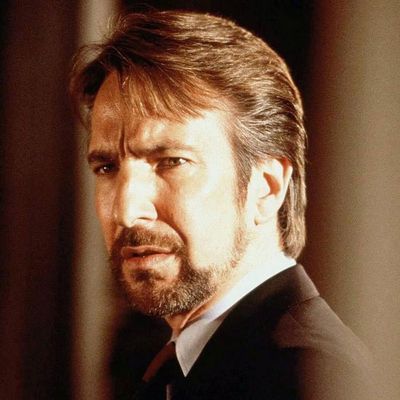
There had, of course, been American action movies before 1988, but the golden age of the action genre began with Alan Rickman’s performance as Hans Gruber in Die Hard. You can pinpoint his impact on the genre even more specifically, to a particular moment in the film, when Gruber, the dapper terrorist, is interrogating Mr. Takagi, the genial head of the firm that occupies Nakatomi Plaza. Gruber prods Takagi to reveal the code to the building’s vault. Takagi, calmly and even cordially, explains that he doesn’t know the code. “I’m going to count to three,” Gruber says. “There will not be a four.” Mr. Takagi, now flustered, says, “Get on a jet to Tokyo and ask the chairman. I’m telling you, I don’t know it. You’re just going to have to kill me,” to which Gruber says, “Okay,” and does. This is the precise moment that we, the audience, know that Gruber is a different breed of villain — and that Rickman is about to show us something we’ve never seen in an action film before.
At the time, Rickman, who died today at age 69, was a 42-year-old British actor who’d never before appeared on the big screen. With Hans Gruber, he delivered a performance that now stands as one of the most indelible villains in screen history, as well as the single best piece of acting in any action film ever, period. What distinguishes Rickman’s performance is simple: Rickman is an excellent actor. This had never been a qualification for movie villains before. It had certainly not been a qualification in the nascent genre of American action thrillers. We’d seen oleaginous European bad guys, sure, and trigger-happy psychopaths, but never a character whose elegance and savagery are so convincingly and dexterously intertwined.
Rickman’s line-readings in the film are now legendary — you could pick any of five or six as his best — and he elevated simple gags, like “He won’t be joining us … for the rest of his life,” to moments of menacing poetry. Appropriately, many of Gruber’s most memorable scenes in the film are themselves explicitly about acting: for example, on the roof, when he seems to gull John McClane by claiming to be a cowering fellow American hostage named “Clay, Bill Clay.” And, of course, Gruber’s whole plot is a feat of acting — he’s not really the principled terrorist he presents to the FBI, but simply a greedy crook looking to get his hands on a vault full of millions. Gruber is a thief wearing masks on top of masks, and as the movie rolls, he strips each mask away. Legendarily, producer Joel Silver and director John McTiernan cast Rickman after seeing him onstage as Valmont in a production of Dangerous Liaisons, a performance about which the New York Times wrote, “Alan Rickman was an ideal Valmont, a snake disguised as a seductive fox.” (It’s telling that many still consider Rickman the definitive Valmont, even when compared to John Malkovich’s iconic onscreen performance in the same role.) Gruber is, in many ways, that same snake and that same fox: a German Valmont, armed with a gun, his lust directed not at virtuous women but at negotiable bearer bonds.
Simply put, in this one role, Rickman did what few actors in film history have managed to do: He broke the rules, then wrote new rules for everyone after him to follow. Hans Gruber isn’t the faceless, disposable thug of, say, the Dirty Harry franchise; he isn’t the sneering, scenery-gobbling Bennett in Commando; he isn’t Blofeld, scarred and grimacing and stroking a furry white cat. Rickman brought Shakespearean-level acting chops to in a film about a New York cop trapped in a building full of bad guys. And he introduced to action films the notion that the villain can be just as compelling, if not more so, than the hero — and that, in the hands of the right kind of enormously skilled actor, he can be a figure of devilish complexity. It goes without saying, perhaps, that actors as enormously skilled as Rickman turn out to be in very short supply.
Imagine trying to play an action-film villain in the wake of Die Hard — imagine being, say, Dennis Hopper, no slouch onscreen and an actor known to convincingly bring the menace (see Frank Booth), but whose gibbering bad guy in 1994’s Speed pales in comparison to Gruber. Or John Malkovich, playing Mitch Leary in 1993 in In the Line of Fire — a performance that earned Malkovich an Oscar nomination but with which, as with Valmont, he couldn’t best Rickman’s work. In fact, Rickman’s Die Hard performance was the reason why actors like Hopper and Malkovich were being cast as bad guys in action films in the first place. Hans Gruber is permanently perched atop every list of the Greatest Action-Movie Villains — all of which, frankly, should simply read: (1) Hans Gruber and (2) All the Other Ones — for a one very good reason: No actor before him was ever expected to be that good, and no actor after him has ever managed it. Rickman, among his many other career accomplishments, single-handedly lifted the American action genre to the outskirts of art. He redefined what was possible. No matter the role or the venue, that’s the ultimate legacy an actor can achieve.

